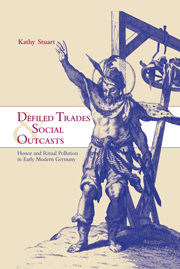Book contents
- Frontmatter
- Contents
- List of illustrations
- Acknowledgments
- List of abbreviations
- Glossary
- Introduction: defiled trades
- PART I THE MEANING OF DISHONOR IN EARLY MODERN SOCIETY
- PART II THE DISHONORABLE MILIEU
- PART III PARADOXICAL DISHONOR: PUNISHMENT AND HEALING
- PART IV ARTISANAL HONOR AND URBAN POLITICS
- 7 Guardians of honor: artisans versus magistrates
- 8 Honor and dishonor in the eighteenth century
- Conclusion: dishonor and the society of orders
- Selected bibliography
- Index
- CAMBRIDGE STUDIES IN EARLY MODERN HISTORY
8 - Honor and dishonor in the eighteenth century
Published online by Cambridge University Press: 06 August 2009
- Frontmatter
- Contents
- List of illustrations
- Acknowledgments
- List of abbreviations
- Glossary
- Introduction: defiled trades
- PART I THE MEANING OF DISHONOR IN EARLY MODERN SOCIETY
- PART II THE DISHONORABLE MILIEU
- PART III PARADOXICAL DISHONOR: PUNISHMENT AND HEALING
- PART IV ARTISANAL HONOR AND URBAN POLITICS
- 7 Guardians of honor: artisans versus magistrates
- 8 Honor and dishonor in the eighteenth century
- Conclusion: dishonor and the society of orders
- Selected bibliography
- Index
- CAMBRIDGE STUDIES IN EARLY MODERN HISTORY
Summary
In 1790 the enlightened Prussian physician and journalist Christian Gottfried Grüner published a pamphlet in which he lauded the humanitarian advances of his century, while lamenting the fact that executioners and skinners had not benefited from such social reforms:
The history of modern times provides inspiring examples of humanitarianism towards the oppressed… Here in Germany, Jews have been given greater freedoms… In England… criminals are being transported to Botany Bay as useful colonists, instead of being hanged. In Hungary, attempts are being made to accustom vagrant, thieving, and lazy gypsies to a settled life and to turn them into useful citizens. Do not skinners have a claim to more humane treatment by their fellow citizens as well?
Social commentators in eighteenth-century Germany lamented that the “prejudice” of the dishonor of executioner and other defiled trades persisted “in our enlightened century.” But appeals to reason and humanity notwithstanding, the position of dishonorable people deteriorated in the course of the century. The development is paradoxical. The legal status of executioners and skinners gradually improved. The imperial police ordinance of 1731 legitimated all defiled trades “except the skinner alone.” The imperial decree of 1772 rehabilitated the children of skinners, and reaffirmed that executioners were already honorable. A number of territorial states also issued general mandates rehabilitating dishonorable trades. Austria and Prussia were the most forceful in this regard. But dishonor sparked more social conflict in the eighteenth century than ever before.
- Type
- Chapter
- Information
- Defiled Trades and Social OutcastsHonor and Ritual Pollution in Early Modern Germany, pp. 222 - 252Publisher: Cambridge University PressPrint publication year: 2000

